Peter MALONE
Saturday, 18 September 2021 19:21
Tuskegee Airmen, The
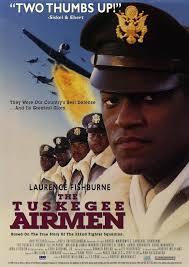
THE TUSKEGEE AIRMEN
US, 1995, 106 minutes, Colour.
Laurence Fishburne, Cuba Gooding Jnr, Andre Braugher, Allen Payne, Malcolm- Jamal Warner, Courtney B. Vance, Christopher Mac Donald, John Lithgow, Daniel Hugh Kelly, Rosemary Murphy, Ed Lauter.
Directed by Robert Markowitz.
The Tuskegee Airmen is a tribute to the Fighting 99th, the first squadron of black airmen in World War Two. It is a film showing the prejudice against black Americans at the time, their path being thwarted in becoming recognised airmen. The film concludes with them being requested to be escorts in the bombing of Berlin.
The film is conventional in its presentation of the characters, their training, the difficulties, the aerial warfare, heroism and deaths. War footage is included. There are also photos, especially in the final credits, of the actual Tuskegee airmen.
A strong cast of American black actors brings this episode of World War Two alive.
1.The tribute to the black American airmen of World War Two? A memoir after 50 years? The use of actual footage? Of the photos of the actual airmen?
2.The impact for an American audience, of the '90s? Memories of war? Prejudice?
3.The history of the involvement of America in the war, the aftermath of Pearl Harbor? The selection of the black trainees? The exams and their success, their academic backgrounds? The detail of their training? Their ambitions being thwarted? Their heroism?
4.The introduction to the characters on the train going to Tuskegee? The experience of prejudice and having to move for the German prisoners? The bus, the arrival, the usual routines, the officers and the tough stances? The varying reactions of the men? Having to take the exam again? The training, the bonds between the men?
5.The white officers? Rogers and his sympathy? Joy and his prejudice? Verbal attacks, making it difficult for the men, the second exam? Glen as the liaison and his being involved in the decisions? The attitude towards the experiment with the airmen? The comments about "you people, serving your people", the chain of command from the President to the cadets? Life on the base?
6.Success and failures in training? The ambitions of the men? The dangers?
7.Hannibal Lee as leader, his presence, Iowa background? His attitude towards Major Joy? His friendship with the men, supporting them, urging them not to quit? His friendship with Tank and the service of his own plane? The sequence of his landing and the chain gang and their response?
8.Lieutenant Glen, liaison officer, his Canadian experience, his agreeing with the dismissal of Peebles? Tough stances, having no friends?
9.Walter Peebles, his background, his showing-off flight? His leaving? Taking the plane, the crash? Arguments about the blame for his death?
10.Billy, the Harlem background, training, friendships, survival, the bond with Hannibal? Their combat and escort work together? His being hit, dying, posthumous medal?
11.Cappy, his background, success? His being blamed by Senator Conyes? His death?
12.The success of the experiment, the joy of the graduation? Acceptance into the American Air Force?
13.The senate inquiry, the psychological reports about blacks and their fitness for air service?
14.Eleanor Roosevelt, her arrival at the base, her sardonic attitude towards the officers, her ability to charm people, going on the flight with Hannibal, being photographed?
15.Tank, friendship with Hannibal, the support group taking care of planes?
16.North Africa, the racism? The nature of the missions, the strategy? The seeking of glory? Wanting combat? Davis and his leadership of the men?
17.The Washington hearings, the bias of Senator Conyes? His visit to Africa and his antagonism? General Stevenson and his presence? Davis and his speech - especially about being American and being accepted only when the mood of the white people suited? The patriotic tone of the speech?
18.The transfer to Italy, combat, the escort work?
19.The reaction of the white pilots to being saved by the blacks? The Texas man not wanting to acknowledge their presence? His later change of heart and requesting them for the mission to Berlin?
20.The achievement, the medals, the honoured place in World War Two?
Published in Movie Reviews
Published in
Movie Reviews
Tagged under
Saturday, 18 September 2021 19:21
Tudor Rose
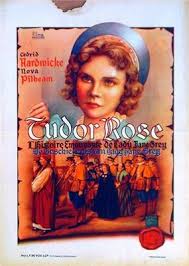
TUDOR ROSE
UK, 1936, 78 minutes, Black and white.
Cedric Hardwicke, Nova Pilbeam, John Mills, Felix Aylmer, Leslie Perrins, Frank Cellier, Desmond Tester, Gwen Frangcon Davis, Sybil Thorndike, Martita Hunt, Miles Malleson, John Laurie.
Directed by Robert Stevenson.
Tudor Rose is a more lavish production than might have been expected from Britain in the mid-'30s. It is the story of Lady Jane Grey, the Tudor Rose, who was chosen for political purposes to succeed Edward VI and became a scapegoat for the clash between Catholics and Protestants. She was also the victim of the Seymour family and their influence over Henry VIII and Edward VI. She and her husband Dudley were executed - seeming innocents, pawns of aristocratic power struggles.
Nova Pilbeam (Hitchcock's Young and Innocent) is an attractive Lady Jane. John Mills plays Lord Dudley. There is a strong supporting cast including Cedric Hardwicke and Felix Aylmer. The story was used in a rather more elaborate version from the '80s, Lady Jane, with Helena Bonham Carter and Cary Elwes, directed by Trevor Nunn.
1.A British historical film of the '30s? Its popularity in its time? Perceptions of British royal history?
2.The black and white photography, the elaborate sets, costumes, musical score? Re-creation of the Tudor period?
3.The title, the focus on Lady Jane Grey, perceptions of her, her memory? The innocent Tudor victim?
4.The historicity of the film: the reign of Henry VIII, the Reformation, the heir to Henry VIII, Edward VI, Catherine and Elizabeth? The role of the Seymours and their influence, especially over Edward VI? The Dudleys, the Greys? Users and used?
5.The film's dramatising of the politics of succession? Edward VI and his illness? Lady Jane Grey and the choice, the manoeuvres, the battles? Mary and the legitimate succession, the confrontation with the Seymours and the Dudleys, her encounter with Jane - and her regrets at the execution of Jane for treason?
6.The period of the Reformation and the Tudors, 16th century divine right of kings, male succession, power struggles and emerging nationalism?
7.The portrait of the Seymours, their plots, sinister? Warwick? Characters, their plotting, deaths? The influence on Edward VI and their downfall?
8.The picture of Edward VI, the young boy, not knowing what was happening around him, his attempts at ruling, the protectorate, the influence of the Seymours? His illness and collapse?
9.Jane Grey and her parents, quietly in the country, her encounter with James Dudley, the plans of the parents, the money and status deals, her not willing to be queen? The love for James, the separation from him? The visit with Mary? The sentence to death, the pathos of her execution?
10.James and his family, their influence, using him and their ambitions for a marriage with Lady Jane? Warwick and the plots? The collapse of the Revolution? The accession to the throne of Mary and her vindictive attitude towards those accused of treason?
11.An interesting glimpse of 16th century politics and religion?
Published in Movie Reviews
Published in
Movie Reviews
Tagged under
Saturday, 18 September 2021 19:21
True Blue
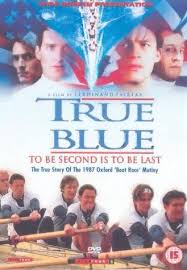
TRUE BLUE
UK, 1996, 110 minutes, Colour.
Johan Leyson, Dominic West, Dylan Baker, Josh Lucas.
Directed by Ferdinand Fairfax.
True Blue is a film about an Oxford scandal, the mutiny of the Oxford boatrace teams in 1987. It was based on a book written by one of the chief protagonists, the coach, Daniel Topolsky (played by Johan Leysen).
The film focuses on the personalities of the British and the Americans (especially played by Dominic West and Josh Lucas). The film shows a number of meetings where boatmen clash, where the coach is ousted and reinstated, where there is discussion about the spirit of Oxford rowing, the importation of Americans.
The film has a lot of scenes of rowing, training. Many thought it was the successor to Chariots of Fire but the film does not have the lyricism and the idealism of that film.
However, it is a very British look at a very British situation, with the perspective of the difference between Britain and the United States. The film was directed by Ferdinand Fairfax, who has had a mixed career as a film director both in Britain and in New Zealand.
1.A film about a sport, a club and an organisation, human nature and conflict? The will to win?
2.Panavision photography, the Oxford locations, the river? The interiors of the college? Pubs? The change of seasons? The musical score?
3.The title and the focus on Oxford and Cambridge? The boat race? The blue blood and the true blue blood?
4.The film based on a true story, the atmosphere of the '80s? The facts, the clash, the Americans and the British? The point of view of the coach and his writing the original novel? Donald McDonald? as technical adviser to the film? An Oxford interpretation?
5.The opening with Donald and the mountains, the rowing, the transition to Oxford, the 1986 race, the effort, Cambridge winning, the effect of the loss, morale, the response of the coach, the subsequent meetings, the nature of the rowing club and its authorities, members? The rumour about the sacking of the coach? The possibilities for the next year? The Americans?
6.The zeal and ambitions of the rowers, especially Donald and Ross? The discussions about being president of the club? Donald becoming president? The ethos of Oxford, the race, the room with the oars, the long tradition?
7.The decision to recruit the Americans? Ross and his tactics, going to Warren and Chambers? The other Americans? Their American style, reputation, the Olympics? Personal success? The American characters and their style?
8.Americans versus British? In the context of Oxford, arriving, the car, shouting out to the women? The college, old-fashioned, the cold, the gas meter? The discussions? Their response to Topesco? Their demands for democracy and contribution to the plans and the regimes? The subsequent politicking on their part and talk about impeaching presidents? Loud, banding together, defying Topesco? The program, the training, their condemnation of it as old-fashioned? Their meetings, strikes? The attempts at compromise? The relationship with Donald, as president, in liaison with the authorities, his taking their side, the decision to oust him after the competitive race with Ross?
9.The contrast with British traditions, the pubs, the practical jokes, study, homes, parties?
10.The portrait of training and its repercussions? The reflections on the 1986 loss? The ethos of winning? The significance of individuals compared with the team?
11.The character of Don, diplomatic or not? His relationship with his wife and child? The friendship with Michael the Jesuit? The birthday party? His taking a stand against Topesco, yet supporting him, their conversations? The pressure by the Americans, the strike, his taking sides? Their ousting him after the competitiveness with Ross? His attitude towards the second crew, the decision to use them? Their complaints against him but their decision to follow? The interactions with Dan and the final decisions to use the second crew?
12.Ross, American, individualist, a proud man, competitive, doing his best under pressure, his casual approach to timetable, finally on the line, comparison with Donald, trying to persuade him to compromise? His being ousted, supporting the team on the bridge at the end?
13.The Americans, their manner, interactions, ganging together, talk of democracy, against the regime, the training, at their own time? Their finally being outmanoeuvred and their resentment? Leaving? Individuals rather than team members?
14.The presentation of the British types, as students, friends, their reactions to the Americans, the training, the reaction to Donald, their final support, working together as a team?
15.The rowing club officials, their fickle attitude towards the Americans, wanting to win?
16.Dan Topesco, his character, presented as indecisive? Lacking diplomatic tact? The importance of the team, faced with the strike, the compromises, wanting to resign? The American's support at the dance, yet turning against him? The spirit of Oxford, his own career, the final team, the training, getting them to support each other, the final race and triumph?
17.Michael the Jesuit, friendship with Donald, the meeting and his rhetorical and emotional speech and its carrying the day? The vote?
18.The final sequences of training, the actual race, the manoeuvres, using the weather, the triumph of the win?
19.A very masculine film, competitiveness and winning? The importance of competitive issues in sport, associations, organisations? The ethos of winning is all?
Published in Movie Reviews
Published in
Movie Reviews
Tagged under
Saturday, 18 September 2021 19:21
True Blood
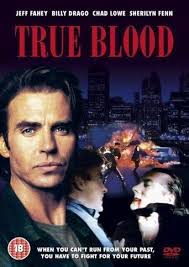
TRUE BLOOD
US, 1989, 100 minutes, Colour.
Jeff Fahey, Chad Lowe, Sherilynn Fenn.
Directed by Peter Maris.
True Blood is a small-budget film about New York gangs. It has the gritty tone of the streets, the violence of the clashes between gangs and gangs and police. However, it has a human touch with the story of the two brothers and their struggles. Jeff Fahey (a look-alike for Paul Le Mat) is the hero, Chad Lowe is the younger brother, Sherilynn Fenn (the sexpot of Two Moon Junction) gives a credible performance as the sympathetic waitress. James Tolken plays, as in so many films, the police lieutenant. Not bad of its kind.
1.A picture of New York gangs, the police, the human background?
2.New York city, the streets, violence? The '70s and the '80s, the same and the change? Action sequences? Musical score?
3.The title and its meaning: the two boys, the bonds of blood, their name?
4.Ray as a young member of the gang, love for Donny, offering hopes in Wyoming, the clash with Spider, the fight, the murder of the policeman on the roof, the chase, the car, the station and Ray's leaving Donny, getting on the train?
5.Ray and 10 years in the Marines, seeking Donny, the changes in the streets, discussion with Bob, Donny and the gang, Spider? Getting work from Frank? Friendship with Jennifer, talk about poetry? Finding Donny wounded, sewing him up, the friendship with Jennifer? Eluding the police? Frank letting him go? Going to the police precinct, the deal with Hanley, the truth? Confronting Masters, being shot? The reconciliation with Donny? Going to Wyoming?
6.Donny as the little boy, left at the station, member of the gang, the influence of Spider, clashing with Ray, following him, the robbery and his being wounded, his being sewn up, leaving, the apology to Jennifer, talking things over with her, the pursuit, finding Ray, shooting Masters, the deal, leaving with Ray?
7.Jennifer and her work, her explanation of her tough past, tough, the poetry, helping, the talk with Donny, being terrorised in her apartment? The happy ending?
8.Hanley, the initial chase, his anger, the pursuit of Ray, staking out the house, the escape in the garbage truck? The deal? The finale?
9.Spider and his gang, ugly, vengeance, interrogating Bob and burning him? Confrontation with Ray, his being shot?
10.The sentiment underlying the film, the relationship of the two brothers, with Jennifer, Frank and his help? The tough police and giving people a break? The blend of toughness and sentiment?
Published in Movie Reviews
Published in
Movie Reviews
Tagged under
Saturday, 18 September 2021 19:21
Trottie True
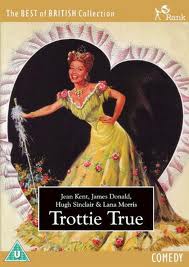
TROTTIE TRUE
UK, 1949, 98 minutes, Colour.
Jean Kent, James Donald, Hugh Sinclair, Bill Owen, Andrew Crawford, Lana Morris.
Directed by Brian Desmond Hurst.
Trottie True is a light British period comedy drama. It is typical of so many of the films coming from Britain in the late '40s and early '50s. Jean Kent, often the villain, has a much more sympathetic role as the heroine. The supporting cast includes a young James Donald and Michael Medwin, Lana Morris and Hattie Jacques appearing in a small part. The setting is the turn of the century, the colour photography and costumes are attractive. The story is slight - a rags to riches story and the testing of true love. Direction is by Brian Desmond Hurst, director of many British films at this period.
1.The title, the focus on Trottie, portrait of a woman at the turn of the century, in her period?
2.British atmosphere, costume design, style and flavour, the period? Colour photography? Songs and the musical score?
3.The flashback structure, Trottie's decisions, the ending and her going with her husband?
4.The little girl, her parents, the party, the theatre, her audition, performance - and her standing up to the heckling audience? Joe and his friendship, looking after her? Her success, growing up, inviting people to sing, a star of the provinces? Her fellow workers? The invitation to London, to the Gaiety Theatre?
5.A woman of ambitions, an entertainer? Sid and the balloon, crashing into the garden, his clothes being mended and the meal? His accompanying Trottie, the attraction, sharing ideas and vision, falling in love? Opportunities for Trottie, the entrepreneur and the dinner, the clash with Sidney, the decision to break with him?
6.Her girlfriend at the gaiety, sharing notes, jewels, attentions of men, the aristocracy?
7.Landon and his friend, their views on the Gaiety Girls, exploiting them, the meeting, sharing, the proposal, Trottie's accepting, the wedding, her singing and entertaining the guests? Her in-laws and their disdain, acceptance of her? Her fitting into this social life?
8.Her friend's wedding, the fuss, the visitors, Trottie thinking and remembering her story - and going off with her husband?
9.A sketch of a period, people, opportunity? British tone?
Published in Movie Reviews
Published in
Movie Reviews
Tagged under
Saturday, 18 September 2021 19:21
Troop Beverley Hills
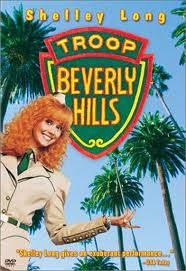
TROOP BEVERLEY HILLS
US, 1989, 106 minutes, Colour.
Shelley Long, Craig T.Nelson, Stephanie Beacham, Mary Gross, Betty Thomas.
Directed by Jeff Kanew.
Troop Beverley Hills is a star vehicle for Shelley Long. She plays a Beverley Hills socialite who is in charge of a team of Wilderness Girls. If audiences have seen Private Benjamin or any other film like it, they will be in no doubt as to how Shelley handles her troop of spoilt and indulged girls - except for the fact that she teaches them survival techniques for the hotels and shops of Beverley Hills.
The film is slight, pleasantly amusing. Shelley Long is a commanding screen presence and dominates Craig T. Nelson as her estranged husband but not quite Betty Thomas as her strong arch enemy in the troop. Mary Gross has an amusing supporting role - sent to infiltrate the troop. Direction is by Jeff Kanew, whose films range from the sombre Natural Enemies to the action Eddie Macon's Run to the humour of Tough Guys and, surprisingly, The Revenge of the Nerds.
1.Enjoyable comedy? Social comment and satire? Piece of American style humour?
2.Los Angeles, Beverley Hills and its locations, wealthy homes, shops, hotels? The surroundings? Musical score and songs?
3.The title and audience expectations? Poking fun?
4.Phyllis and Shelley Long's screen presence? Her application for leadership of the Wilderness Girls and her gossip, spending money, thriftiness? Her lavish style? Cars and clothes? Her daughter? Estrangement from her husband? Their arguments about what had happened in their marriage? Her jealousy and spying on him? Entertaining the girls - and her range of incongruous costumes? The meetings? The clash with Valda at the meeting? Her decision to work with the girls? Fred's scepticism? The getting of the uniforms, getting hers tailor-made? The outing and its raining, roughing it in style? The hotel, telling the stories? Valda's reaction? Getting her underling to infiltrate? The spying, the photos - but success? Teaching the girls survival skills in Beverley Hills - and the satire on their wealth, being spoilt? The girls banding together? Phyllis and her success? The selling of the cookies - and their being outwitted? The decision to win the competition - roughing it, keeping going, winning the first competition, the clash with Valda? The breaking of the bridge? Seeing Valda injured, the decision to bring her back? Winning the race, the last one across the line? The example for the girls - charity and concern? Fred's admiration? Her bond with her daughter? Happy ending?
5.The girls, their wealthy background, actor fathers, overseas trippers? The Asian dictator and his wife? The lonely girls? Together, the troop, enjoying Phyllis's company, the stories, being spoilt, the shopping? The clash with the rugged Wilderness Girls? Working together, their final victory? The danger on the log across the river - symbol of achievement?
6.Fred, his ambitions, support by Phyllis, the advertisements? Alienation, her shopping? His moving out, trying to remind her of what she was? His girlfriends - and the socials, the parties? Exciting her jealousy? Supporting her and her achievement, the reconciliation?
7.Valda, the caricature of the tough Wilderness Woman, rousing on her daughter, her daughter calling her `Sir'? The meetings, the clash with Phyllis? At executive meetings? Her underling and the infiltration? Growing exasperation, visiting the hotel? The cookies and her techniques? The photos? The competition, her wanting to win, going with the girls, her injuries, being carried back, being sacked?
8.Valdaa's underling, under her command, the infiltration, moving in with the family, taking the photos, seemingly compromising? Reporting back? Her decision to throw the camera away, support Phyllis, share in the success?
9.The parents and their wealth, manner of living, holidays, relationship with their daughters, promises - and not fulfilled promises? Their daughters' achievements, at the end and success?
10.The light touch, expected comedy, Beverley Hills style, Shelley Long's fashions - and the number of guest stars turning up: Pia Zadora, Cheech Marron etc?
Published in Movie Reviews
Published in
Movie Reviews
Tagged under
Saturday, 18 September 2021 19:21
Tripoli
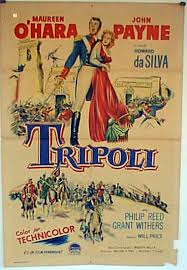
TRIPOLI
US, 1950, 95 minutes, Colour.
Maureen O'Hara, John Payne, Howard Da Silva, Lowell Gilmore.
Directed by Will Price.
Tripoli is a routine costume drama, the type of which Maureen O'Hara made in great frequency during the '50s. As always, she is the fiery heroine. John Payne is a Marine captain. Howard de Silva is a Greek mercenary. There is a good cast - but essentially the film is a horse opera in the African desert. The film was directed by Maureen O'Hara's then husband, Will Price. It has as its background the American presence in Tripoli - and the basis for the lyrics in the Marines Hymn.
1.Popularity of this kind of costume drama? Based on history?
2.Location photography, the atmosphere of the 19th century, Africa, Arab peoples? The American Marines? Battle sequences? Score?
3.The title, its focus, African politics, the American presence? To the shores of Tripoli?
4.O'Bannen and the Americans, his going on the mission, with Tripp? The contacts with the Tunisians? The civil war, the plan of attack? Meeting the countess, his severity with her, falling in love? The desert journey, encounters with the prince? Dimitrios and the Greek mercenaries? The American general? The difficulties, the trek through the desert without water, the final battle? Happy ending?
5.Maureen O'Hara as the fiery countess, her ambitions, her maid, wanting to marry the prince, on the expedition, humiliated by O'Bannen, attracted by him? In love with him?
6.Dimitrios, gung-ho attitudes, the Greeks? The prince and his double-dealing? The Arabs?
7.The American general, the presence of the Marines? Keeping peace in that part of the world?
8.Popular routine action adventure?
Published in Movie Reviews
Published in
Movie Reviews
Tagged under
Saturday, 18 September 2021 19:21
Trench, The
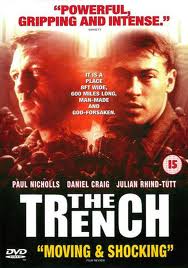
THE TRENCH
UK, 1999, 98 minutes, Colour.
Paul Nichols, Daniel Craig.
Directed by William Boyd.
The Trench is a William Boyd film, written and directed by the novelist who wrote such novels as Stars and Bars, A Good Man in Africa. Boyd re-creates a day and a half in the trenches in northern France, in the Valley of the Somme, at the end of June, beginning of July 1916. The film is generally confined to the trench itself, focusing on a small group of men (very young and volunteers) who are uncertain about the nature of the war and the battle they are about to fight in. They bring their inexperience, immaturity to the interactions in the trench. The action is focused on a young man played by Paul Nichols and a sergeant played by Danny Dyer. There are glimpses only of officers.
While the film shows in detail the life in the trench, it also highlights many of the themes of World War I as portrayed in such films as Paths of Glory, King and Country, Gallipoli, Regeneration.
The film ends with the soldiers going over the top into battle and, in a way very similar to Gallipoli, ends with a freeze-frame.
1.The work of William Boyd, novel writing, film directing? His sensitivity to the issues, characters, interactions?
2.Memories of World War I, the cinema tradition, the trenches, the battles, the massacres and needless slaughter, the indecision of officers and bad decisions? The trauma of war?
3.The title and its focus, contained within the trench itself apart from the ending? The trench a symbol of World War I: its physical detail, size, summer, the confines, the paths and labyrinth, eating and sleeping, urinating, fighting, the snipers and the lookouts...?
4.A portrait of men in the trenches: men together, friendships and clashes, closely confined, the boredom, the talk, the salacious photos, the stories and memories, the irritations, the Sergeant and his keeping up of morale and discipline, the officer and his standards - and inexperience? The dangers, lookouts, snipers, injury and death? Bombs exploding? The young men, volunteers, having to cope? The meticulous detail of life in the trench?
5.The war and its bombardment, the noise and shattering of five days? The uncertainty as to outcome? Information and lack of information? Orders and the interventions of the officer, the changed orders, the lack of information for the orders? Snipers, explosions, injury and pain?
6.The men as volunteers, their dreams of the army, patriotism? Their view of the war, its purpose? The number of deaths in 1914 and the memories in 1916? The growing reality of the war?
7.The picture of the officer, coming to be photographed with the men, the patriotic stances - and yet so much of the filming and the comment seeming foolish?
8.Billy as the focus, his age, innocence and ignorance, his following Eddie into the war, Eddie and his injury to his face? The photos and the recognition of Maria from the post office? His taking the photo and its importance to him before going over the top? His grief and his reaction? The Sergeant and his friendship, talking, morale? On watch? His reactions to the other young men, response? His fears, thoughts about dying, going over the top? The audience sharing his perspective on the war?
9.The Sergeant and his having seen action, the regular army, his wife and children? His being older than the young men, with them, stern, orders - yet friendship and protection? With Horace and going on patrol, the skills in knowing how to survive? With each of the young men, with the officer, sending the man for the rum and his drinking it, persuading the officer to give the whisky? With Billy and the final talks? His wanting to help Billy - and his death?
10.Horace and his size, friendship with Hogg, engaged to Amy, the discussions about the engagement and Hogg's irritation? His gung-ho attitude and wanting to kill Germans? Loyalty to officers, the photo? Going out on the patrol and succeeding? Bringing in the German prisoner? His animosity towards the Germans? His injuries and death?
11.Daventry and his cynical stance, informed, his being reprimanded? His interaction with the prisoner and speaking German? His death?
12.The German prisoner, his age, inexperience, language, grateful for the cigarettes, the interactions with the young men? The glimpse of the Germans and what was happening in the German trenches?
13.Del, cheeky, the photos and his bravado, his anger, going for the rum, drinking it, its being shattered, his fears, going over the top and his death?
14.The glimpse of the other men, Dennis and his offers of friendship, service to the officer?
15.The officer, his background, inexperience, being above the men, having a servant, his meals, the discussions with the Sergeant, his hopes to grow cotton in South Africa, his drinking, unwillingness to give the whisky, finally doing so, his death?
16.An overall picture of a microcosm of World War I? Seen from the perspective of 80 years later?
Published in Movie Reviews
Published in
Movie Reviews
Tagged under
Saturday, 18 September 2021 19:21
Treasure of Pancho Villa
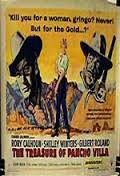
TREASURE OF PANCHO VILLA
US, 1955, 96 minutes, Colour.
Rory Calhoun, Shelley Winters, Gilbert Roland, Joseph Calleia.
Directed by George Sherman.
The Treasure of Pancho Villa is one of those colourful entertainment action pieces of the mid-'50s. Filmed on location in Mexico in Superscope, it boasted Mexican scenery for its adventures while having a rather routine plot. The film shows the rebels at the time of Pancho Villa (as in such films as Viva Villa, Villa Rides). The Federales pursue the rebels. An American mercenary helps one of Villa's colonels to rob a train and transport gold - however, he wants the gold for himself.
The film has such stalwarts as Gilbert Roland as the colonel and Joseph Calleia as the betrayer. Rory Calhoun is the hero and a rather subdued and idealistic Shelley Winters is the heroine.
1.Entertaining action drama? Of its period? Now?
2.Mexican locations, Superscope? Action sequences? Musical score?
3.The title, the focus on gold and the pursuit of wealth? Pancho Villa and the Mexican revolution?
4.The framework of the film with Juan Castro and Tom together, Tom reminiscing? The story of the gold? Betrayal? The final hurrah and confrontation? Juan Castro's death? The loss of the gold? Tom returning to America?
5.Tom as the mercenary, the jobs for the rebels? His wanting to retire, in the city? The appeal of Castro's agent? The train robbery? His gun? Joining the rebels, transporting the gold? Meeting Esther, attracted but stern with her? Pablo as the traitor? The dividing of the group, his rescuing Juan Castro? Wanting to take the gold? The final siege, Castro's death?
6.Castro as the noble rebel leader, his men, the mission for the gold, the taking of the train? The meeting with Esther, her background, decision that she could go? Suspicions of Pablo? The trek, the dangers, the accidents? The dividing of the group? The final siege, his death?
7.Pablo, his place in the village, his wife? His going along with the robbery? His part in the journey? Turning against the group, going to inform the Federales? Leading them to the group, the general making him go forward, his death?
8.Esther as the American teacher, her sympathy to the Mexican cause? Going along with the group? Admiration for Castro? In love with Tom?
9.The familiar picture of the Mexican war? Right and wrong? Pancho Villa and the rebels? The Federales? The type of western action in this revolution?
Published in Movie Reviews
Published in
Movie Reviews
Tagged under
Saturday, 18 September 2021 19:21
Trouble in the Glen
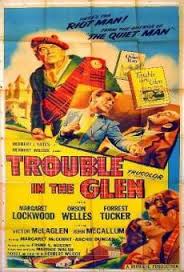
TROUBLE IN THE GLEN
UK, 91 minutes, Colour.
Margaret Lockwood, Orson Welles, Forrest Tucker, Victor Mc Laglen, John Mc Callum, Eddie Byrne, Archie Duncan, Moultrie Kelsall.
Directed by Herbert Wilcox.
Trouble in the Glen is based on a popular story by Maurice Walsh. It is an Anglo- American co-production between Herbert Wilcox, husband of Anna Neagle, and Herbert Yates of Republic Pictures. It has attractive Scottish locations - and an odd blend of American and English stars led by Orson Wells, Margaret Lockwood as his daughter, and Forrest Tucker. Australian John Mc Callum is the Scots tinker son of Victor Mc Laglen.
The film shows the clashes in the highlands, the outsider laird coming back to take his position and dominate the people, as well as the locals and their clash with the gypsies. A lot of Scottish flavour.
1.Entertaining comedy drama? Scotland?
2.Location photography, the beauty of Scotland, the landscapes, the water, the castles? Musical score?
3.The title and its reference to the laird, romance, the gypsies and the fights?
4.Orson Welles as the laird, his voice-over and explanation of things? His perspective? His severity, against the gypsies? With his daughter? The clashes, his eventually coming to terms - and being accepted?
5.Margaret Lockwood as his daughter, stern, like her father? Interfering? The locals against her? Her meeting the hero, his daughter, mellowing? Clashes, romance? The fight? The reconciliation?
6.Forrest Tucker as hero - the American background, the war, coming home, the couple looking after his daughter, the secret? The clash with the laird? With the gypsies? The couple looking after his daughter? The laird's daughter, clashes and romance? The fights, the final battle - and the reconciliation?
7.His daughter, the polio, her relationship with her foster parents, the truth, her joy, the happy ending?
8.The tinkers, the old father, his aggressiveness, the stealing of the cattle, the hostility of the locals? Malcolm and his aggression, life in the village? Siding with his father? The build-up to the battle?
9.The locals, hostility towards the gypsies, the build-up to the clash, the various sides, arguments, peacemakers? Sorting out the troubles?
10.Memories of the old times in the highlands, the Scots temperament, the clashes, the suspicion of the outsider - but the sense of humour?
Published in Movie Reviews
Published in
Movie Reviews
Tagged under